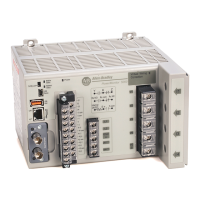Rockwell Automation Publication 1426-UM001J-EN-P - August 2019 459
Appendix F
IEEE 519 Pass/Fail and TDD
IEEE 519 Pass/Fail
Capability (M6 and M8
models)
IEEE 519-1992, the standard for Recommended Practices and Requirements for
Harmonic Control in Electrical Power Systems, provides recommended limits for
the level of harmonics in a circuit. The standard applies these limits to current
and voltage harmonics up to the 40th order present at the Point of Common
Coupling (PCC) between your electric power supplier and your facility, typically
where utility meters are connected. The standard recommends limits for
individual harmonic components and limits for Total Demand Distortion
(TDD).
TDD is similar to THD except TDD is based on the maximum, rather than
measured, fundamental load current.
The standard specifies distortion limits for long-term conditions, greater than
one hour. In the short term, these limits can be exceeded by 50%. The
PowerMonitor 5000 unit provides these results:
• Short Term: the 1 minute rolling average, which is updated at a 10 second
rate.
• Long Term: the 1 hour rolling average, which is updated at a 10 minute
rate.
The recommended limits for current and voltage harmonic distortion, expressed
as a percentage of the fundamental, are listed in the following tables.
Table 225 - IEEE 519 Current Distortion Limits (120 V…69 kV)
Ratio of MAX_Isc
to MAX_IL
Individual Harmonic Order
1 … 10 11 …16 17 … 22 23 … 34 35 … 40 TDD
Less than 20 Odd 4.0 2.0 1.5 0.6 0.3 5.0
Even 1.0 0.5 0.4 0.2 0.1
20…49.99 Odd 7.0 3.5 2.5 1.0 0.5 8.0
Even 1.8 0.9 0.6 0.3 0.1
50…99.99 Odd 10.0 4.5 4.0 1.5 0.7 12.0
Even 2.5 1.1 1.0 0.4 0.2
100…999.99 Odd 12.0 5.5 5.0 2.0 1.0 15.0
Even 3.0 1.4 1.3 0.5 0.3
1000 and higher Odd 15.0 7.0 6.0 2.5 1.5 20.0
Even 3.8 1.8 1.5 0.6 0.4

